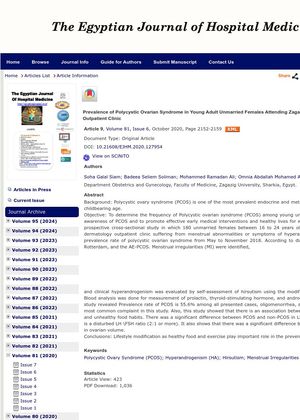Prevalence of Polycystic Ovarian Syndrome in Young Adult Unmarried Females Attending Zagazig University Hospital Outpatient Clinic
October 2020
in “
The Egyptian Journal of Hospital Medicine
”

TLDR More than half of the young women checked had PCOS, which was linked to inactive lifestyles and poor diets.
Three years ago, a prospective cross-sectional study was conducted on 180 unmarried females aged 16 to 24 years who were attending a gynecology and dermatology outpatient clinic due to menstrual abnormalities or symptoms of hyperandrogenism. The study aimed to estimate the prevalence rate of Polycystic Ovarian Syndrome (PCOS) from May to November 2018. The study found that the prevalence rate of PCOS was 55.6% among all presented cases, with oligomenorrhea, acne, and hirsutism being the most common complaints. The study also found an association between PCOS and a sedentary lifestyle, as well as unhealthy food habits. There were significant differences in LH and prolactin levels, as well as ovarian volume, between PCOS and non-PCOS cases. The study concluded that lifestyle modifications such as healthy food and exercise play an important role in the prevention of PCOS.









